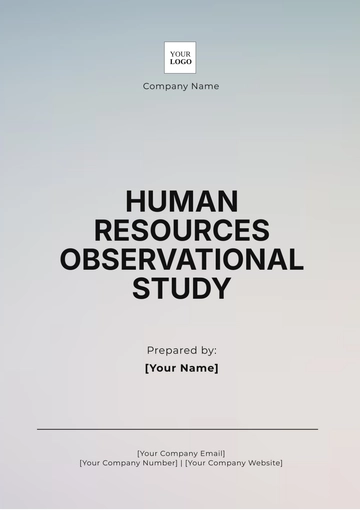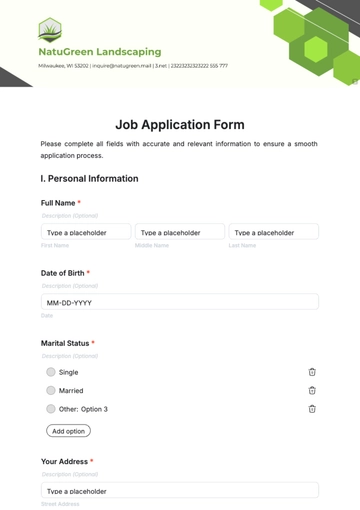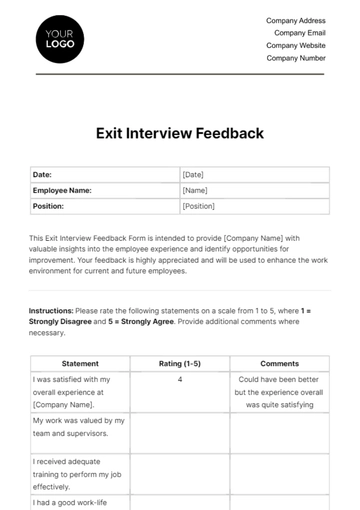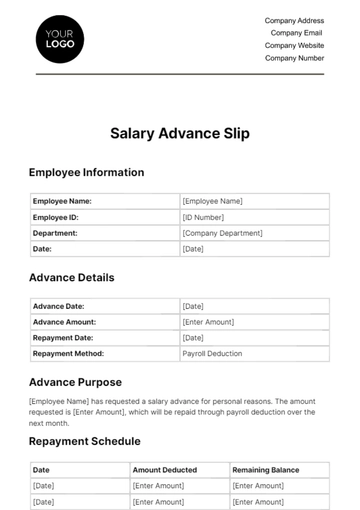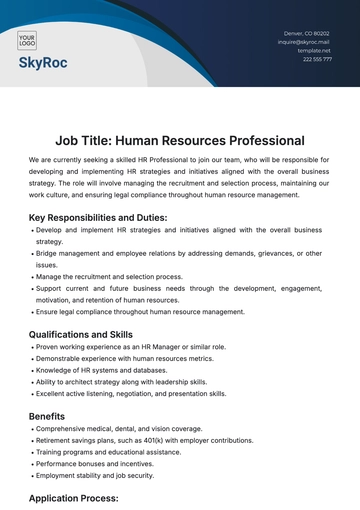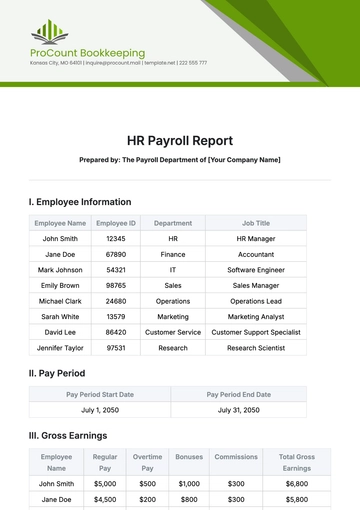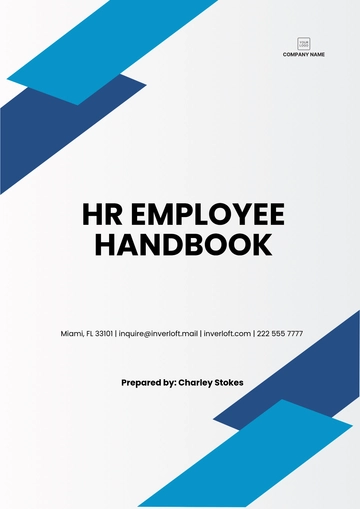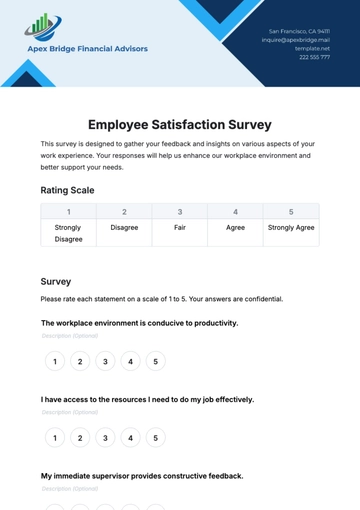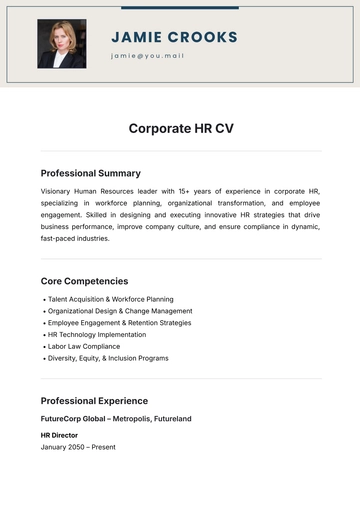Free Compensation Structure Outline HR
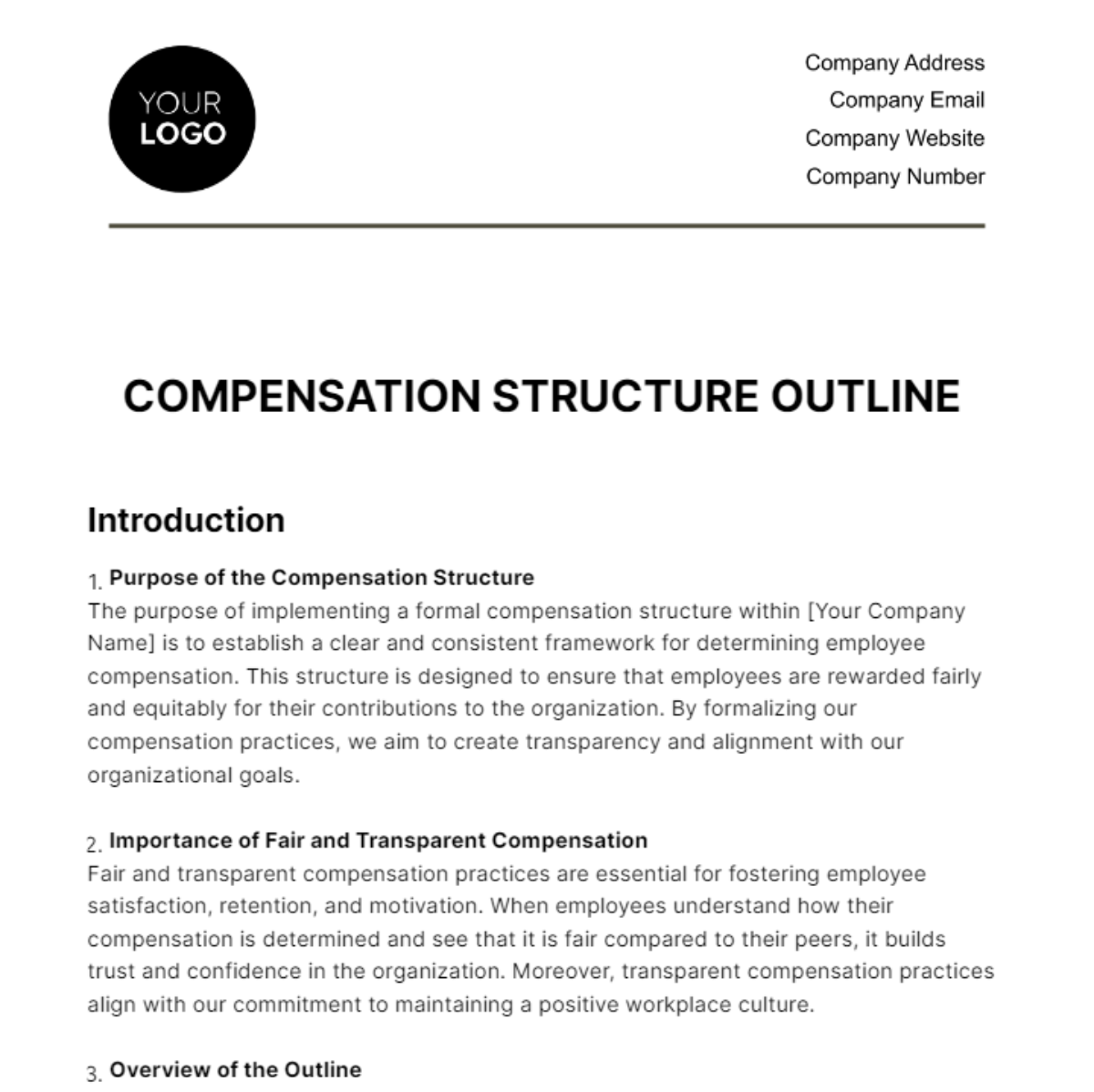
Introduction
Purpose of the Compensation Structure
The purpose of implementing a formal compensation structure within [Your Company Name] is to establish a clear and consistent framework for determining employee compensation. This structure is designed to ensure that employees are rewarded fairly and equitably for their contributions to the organization. By formalizing our compensation practices, we aim to create transparency and alignment with our organizational goals.
Importance of Fair and Transparent Compensation
Fair and transparent compensation practices are essential for fostering employee satisfaction, retention, and motivation. When employees understand how their compensation is determined and see that it is fair compared to their peers, it builds trust and confidence in the organization. Moreover, transparent compensation practices align with our commitment to maintaining a positive workplace culture.
Overview of the Outline
This Compensation Structure Outline provides an organized overview of the key components of our compensation system. It covers our compensation philosophy, various compensation components, job evaluation and grading, the compensation review process, equity considerations, communication strategies, performance-based compensation, compensation administration, and concludes with a reinforcement of the importance of fairness and equity in our compensation practices.
Compensation Philosophy
Company's Compensation Philosophy
Our compensation philosophy centers on rewarding employees based on their performance, skills, and contributions. We believe in recognizing and incentivizing excellence and aligning compensation with our company's mission, vision, and values. Our philosophy reflects our commitment to attracting, retaining, and motivating top talent.
Alignment with Organizational Goals
Our compensation philosophy is in alignment with the strategic objectives of [Your Company Name]. We understand that a well-structured compensation system not only attracts talent but also supports our growth and profitability goals. By rewarding high performers and providing competitive compensation packages, we ensure that our employees remain engaged and motivated to contribute to our success.
Commitment to Equity and Fairness
We are committed to ensuring equity and fairness in our compensation practices. Regardless of an employee's background, identity, or role within the organization, we strive to provide equal pay for equal work. We regularly review and adjust our compensation structures to identify and rectify any disparities, thereby promoting a diverse and inclusive work environment.
Components of Compensation
Base Salary
Definition and Purpose
Base salary represents the fixed portion of an employee's compensation and serves as a consistent source of income. It provides financial stability and reflects the inherent value of the employee's role within the organization.
Factors Influencing Base Salary
Several factors influence an employee's base salary, including job responsibilities, experience, performance, and market conditions. We ensure that base salaries are competitive in the market while also reflecting individual contributions.
Pay Frequency
Base salaries are typically paid on a [Frequency] basis (e.g., monthly or bi-weekly) to provide financial predictability and meet the immediate needs of our employees.
Variable Compensation
Bonuses and Incentives
Variable compensation includes bonuses and incentives that reward exceptional performance, meeting or exceeding predefined targets, or achieving specific milestones. These incentives motivate employees to strive for excellence and align their efforts with our organizational goals.
Stock Options or Grants
In some cases, employees may be eligible for stock options or grants, providing them with a stake in the company's success. This form of variable compensation aligns employee interests with long-term company performance.
Commission Plans (if applicable)
For sales and revenue-focused roles, commission plans may be implemented, offering a percentage of sales as additional compensation. These plans incentivize employees to drive sales and revenue growth.
Benefits
Health Insurance
Our benefits package includes comprehensive health insurance coverage to support the well-being of our employees and their families. This coverage encompasses medical, dental, and vision care.
Retirement Plans
We offer retirement plans, such as a 401(k) or pension scheme, to help employees plan for their financial future. These plans enable employees to save for retirement with employer contributions and tax advantages.
Paid Time Off (PTO)
Employees are provided with paid time off to recharge, relax, and address personal matters. PTO includes vacation days, sick leave, and holidays, promoting a healthy work-life balance.
Other Benefits
In addition to the core benefits, we offer supplementary benefits like disability insurance, life insurance, and flexible spending accounts to enhance the financial security and peace of mind of our employees.
Perks and Allowances
Company Car
In some cases, employees may receive a company car as part of their compensation package, particularly if their role involves frequent travel or client meetings.
Housing Allowance (if applicable)
For employees relocating for job-related purposes, we may provide a housing allowance to ease the transition and ensure a smooth start in their new location.
Education Assistance
We encourage continuous learning and development by offering education assistance programs. This may include tuition reimbursement for job-related courses or degree programs.
Wellness Programs
Our wellness programs promote the physical and mental health of our employees through initiatives such as gym memberships, wellness challenges, and mental health resources.
Non-Monetary Benefits
Flexibility and Work-Life Balance
We value work-life balance and offer flexible work arrangements to accommodate the diverse needs of our employees, such as remote work options and flexible hours.
Professional Development Opportunities
To support career growth, we provide access to professional development opportunities, including training, workshops, and mentorship programs.
Recognition and Awards
We acknowledge and celebrate outstanding contributions through recognition programs, awards, and peer appreciation initiatives, fostering a culture of appreciation and achievement.
Job Evaluation and Grading
Job Evaluation Process
Our job evaluation process involves a systematic assessment of each role within the organization. We rely on accurate job descriptions and may use compensation surveys to gather market data.
Pay Grades and Ranges
Definition and Purpose
Pay grades are used to categorize jobs with similar responsibilities and requirements. Each pay grade corresponds to a specific range of compensation, ensuring consistency and fairness in pay practices.
Establishing Pay Ranges
Pay ranges are established based on market data, industry standards, and internal factors. They provide flexibility in compensation decisions while maintaining equity.
Pay Grade Assignments
Each position within the organization is assigned to a specific pay grade based on the job's responsibilities, qualifications, and market value. This assignment guides compensation decisions.
Compensation Review
Annual Compensation Review
Timing and Process
We conduct an annual compensation review to assess the alignment of employee compensation with our compensation philosophy and market conditions. The review typically takes place [Timing].
Performance-Based Adjustments
During the annual review, we consider employee performance as a key factor in compensation adjustments. High-performing employees may receive merit-based increases.
Market Adjustments
To ensure our compensation remains competitive, we make market adjustments based on the results of compensation surveys and benchmarking against industry competitors.
Promotion and Career Advancement
Salary Increases with Promotions
Employees who receive promotions will experience salary increases commensurate with their new roles and responsibilities.
Career Pathing and Advancement Opportunities
We encourage career development through clear career pathing, helping employees understand the steps and opportunities for advancement within the organization.
Market Analysis
Conducting Market Surveys
We regularly conduct market surveys to gather data on industry compensation practices, trends, and benchmarks.
Benchmarking Against Industry Competitors
We benchmark our compensation packages against those offered by industry competitors to ensure we remain competitive in attracting and retaining talent.
Adjustments Based on Market Data
Our compensation decisions are data-driven, and adjustments are made based on the market data obtained through surveys and benchmarking.
Equity and Fairness
Pay Equity
Addressing Gender and Minority Pay Gaps
We are committed to addressing any gender and minority pay gaps that may exist within our organization. Pay equity is a priority, and we regularly review and adjust compensation practices to ensure fairness.
Ensuring Fair Compensation Practices
We continuously monitor our compensation practices to prevent bias or discrimination. Our goal is to provide equal pay for equal work and to create a work environment that values diversity and inclusion.
Communication
Transparency in Compensation
Communicating the Compensation Structure
We believe in transparency and openly communicate the details of our compensation structure to all employees. Transparency builds trust and allows employees to understand how their compensation is determined.
Employee Access to Compensation Information
Employees have access to their individual compensation information, including pay statements and a breakdown of their compensation components, through our secure and confidential systems.
Individual Compensation Statements
Providing Employees with Clear Statements
We provide employees with individual compensation statements that outline their total compensation package, including base salary, bonuses, benefits, and any other components.
Explaining Compensation Components
Our statements explain each compensation component, helping employees understand the contribution of each element to their overall compensation.
Training and Education
Educating Managers and Employees on Compensation
We conduct training and education programs for both managers and employees to ensure a deep understanding of our compensation structure, policies, and practices.
Addressing Employee Questions and Concerns
We actively address employee questions and concerns related to compensation through dedicated channels, such as HR support and regular communication.
Performance-Based Compensation
Performance Management
Linking Compensation to Performance
We emphasize the link between compensation and performance, setting clear performance expectations and using performance evaluations to inform compensation decisions.
Setting Clear Performance Expectations
We provide employees with clear and measurable performance expectations, ensuring alignment with our organizational goals.
Incentive Programs
Designing Effective Incentive Plans
Our incentive programs are designed to motivate employees to excel in their roles and align their efforts with the company's objectives. These programs are regularly reviewed and adjusted for effectiveness.
Monitoring and Adjusting Incentive Structures
We continuously monitor the performance of our incentive programs, making adjustments when necessary to ensure they remain relevant and impactful.
Compensation Administration
HR's Role
Compensation Administration Responsibilities
The HR department is responsible for the administration of compensation practices. This includes managing employee data, overseeing payroll processing, and ensuring compliance with compensation policies.
Ensuring Data Accuracy and Compliance
We maintain accurate employee compensation data to support fair and consistent compensation practices. Additionally, we uphold compliance with relevant employment laws.
Payroll Processing
Accurate and Timely Payroll Management
Our payroll processing is accurate and timely, ensuring that employees receive their compensation on schedule.
Deductions and Withholdings
We handle deductions and withholdings in accordance with legal requirements, including taxes, benefits contributions, and other statutory deductions.
Conclusion
Reinforcing the Importance
In conclusion, a well-structured compensation system is vital to attracting, retaining, and motivating top talent. It supports our organizational goals and fosters a culture of fairness and transparency.
Commitment to Ongoing Evaluation and Improvement
We are committed to continuously evaluating and improving our compensation practices to ensure they remain competitive, equitable, and aligned with our company's objectives.
Encouraging a Culture
We encourage a culture in which all employees feel valued and fairly compensated, fostering a positive and inclusive workplace environment.
- 100% Customizable, free editor
- Access 1 Million+ Templates, photo’s & graphics
- Download or share as a template
- Click and replace photos, graphics, text, backgrounds
- Resize, crop, AI write & more
- Access advanced editor
Optimize your compensation strategy with our Compensation Structure Outline HR Template. This comprehensive guide offers a structured framework for designing and implementing a competitive compensation structure, covering elements such as base salary, bonuses, and benefits. It's an invaluable resource for HR professionals and compensation analysts. Secure your copy today and align your compensation practices with your organization's goals.

